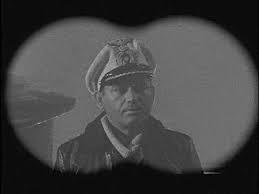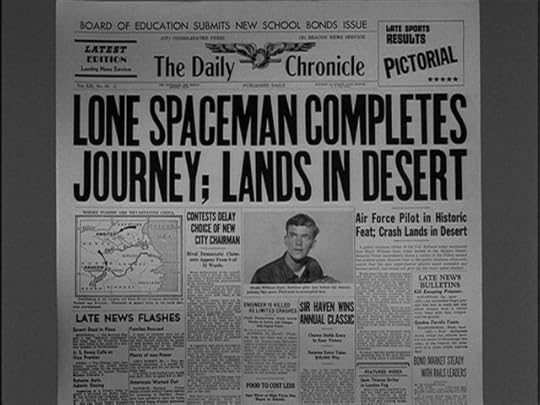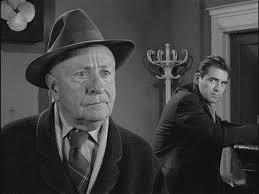July 4, 2024: The Classic Twilight Zone rewatch continues!
Episode 9: “Perchance to Dream”
This episode was first broadcast November 27, 1959.
It’s the first episode not written by Rod Serling. It’s also the first episode to feature the iconic Twilight Zone theme.
The episode is based on a short story of the same name by Charles Beaumont who also wrote the script. Serling was very keen that the script remain true to the spirit of the original work (Which is almost unheard of nowadays). Beaumont delivered an episode that is beat for beat the short story down to the fantastic final line: “I guess there are worse ways to go. At least he died peacefully.” Beaumont was very pleased with the production. According to Beaumont: “It was filmed exactly as written. I know because I was on the set, watching, unable to believe that any of this was truly happening. An author was seeing his work treated with respect.” He also had high praise for director Robert Florey: “He rooted out the meanings of certain lines, frequently surprising me with symbols and shadings I’d neither planned nor suspected.” Beaumont was credited on 22 episodes of the original Twilight Zone although a few near the end of the series run were purportedly ghost written for him by friend and fellow screenwriter Jerry Sohl.
Beaumont was a prolific writer of short fiction, novels, television and film, but he was plagued by a mysterious brain disease that affected his ability to speak and concentrate, a condition some suspect was either early onset Alzheimers or Pick’s Disease. As a result, friends like Sohn and author William F. Nolan stepped up and ghost-wrote some of his later works in order to help him maintain his health coverage. Charles Beaumont died on February 21, 1967 at the age of 38.
Actor Richard Conte, who plays the fatigued and frustrated Edward Hall who is convinced he will die of a heart attack if he falls asleep ironically died of a heart attack at age 65. In one of his final roles, he played Don Barzini, a rival to Don Corleone in The Godfather. He had apparently been on the short-list to play Brando’s role.
John Larch, who plays Dr. Eliot Rathmann, was a professional baseball player before embarking on an acting career. He made a name for himself on radio as Captain Starr of Space. Toronto-born
Suzanne Lloyd played the dual roles of Maya the Cat Girl and the receptionist. A trained dancer, she reportedly worked hard to get her character’s maniacal laugh just right. Loyd retired from acting at the age of 40.
“Time Enough at Last” is an incredibly tough act to follow and while “Perchance to Dream” doesn’t reach its lofty storytelling heights, I really did enjoy the atmosphere of its creepy, lurid black and white carnival sequences (that reminded me of one of my favorite horror movies, Carnival of Souls) as well as the borderline lunatic desperation of our protagonists exhaustive unwillingness to fall asleep. Overall, another solid outing, again buoyed by a clever story and top-notch performances.
Episode 10, Judgment Night
This episode was first broadcast December 4, 1959
In a late 1999 interview with Mike Wallace, Rod Serling said, in reference to this episode: “…in 18 scripts [in the 1st Season], Mike, we’ve had one line changed, which again was a little ludicrous but of insufficient basic concern within the context of this story not to put up a fight. On the bridge of a British ship, the sailor calls down to the Galley and asks – in my script – for a pot of tea, because I believe it’s constitutionally acceptable in the British Navy to drink Tea. One of my sponsors [General Foods] happens to sell Instant Coffee and he took great umbrage, or at least minor umbrage anyway with the idea of saying ‘tea’. Well, we had a couple of swings back and forth – nothing serious – and we decided to ‘ask for a tray to be sent up to the bridge’! But in 18 scripts, that’s the only conflict we’ve had.”
Patrick Macnee, who plays First Officer McLeod, would land the role-of-a-lifetime playing John Steed on The Avengers. He was born into an eccentric family, gambled away the family fortune, was almost expelled from Eton for running a gambling ring, and served in the Royal Navy before finding firm footing on stage and screen. In his heyday, he purportedly smoked 80 cigarettes a day and drank a bottle of scotch every night.
Nehemiah Persoff, who played the part of the cursed U-boat commander Carl Lanser tells of how he asked his stand-in, a German fellow named Freddie, to help him with the pronunciation of his one German line: “Fuel Frei” (“Fire at will”). After repeated attempts, Freddie still wasn’t happy with Nehemiah’s delivery but there was no time for further rehearsal. As they rolled into the scene, Nehemiah-as-Lanser delivered his line, at which point someone shouted “Cut!”. Except it wasn’t director John Brahm yelling cut. It was stand-in, Freddie, who was still not happy with the delivery. Brahm apparently responded with great patience and kindness, talking Freddie down before the next take.
Rod Serling was not happy with the way the episode turned out. “Judgment Night in its original script form was a better than average flight of fantasy,”he said after reviewing the final cut. “It’s filming left it so considerably less than that.” And I would have to agree. Again, a great idea, but everything is so heavy-handed, from Persoff’s maniacally over-the-top performance to the over-wrought direction. This episode is my least favorite to date.
Episode 11, “And When the Sky Was Opened”
This episode was first broadcast December 11, 1959
This episode is an adaptation of a short story by Richard Matheson titled “Disappearing Act” in which our narrator begins to question his sanity after friends and family begin to disappear, literally ceasing to exist as they are wiped from everyone’s memories except his. The story concludes with “I’m having a cup of”, ending mid-sentence, thereby implying our narrator’s erasure as well. According to Matheson, he first submitted the story to an agent only to have it returned ripped to pieces. He finally succeeded in selling it to the Magazine of Science Fiction and Fantasy.
The crash of the X-20 was scripted but ultimately deemed to expensive to produce so, instead, the event is covered in the opening narration.
The moment where Forbes jumps through the bar window wasn’t scripted but suggested by director Douglas Heyes. Serling loved the idea.
Rod Taylor, who plays Lieutenant Forbes in the episode, is better known for roles in The Birds, The Picture Show, and countless westerns and action movies. He apparently refused to screen test for James Bond, deeming the role beneath him – and later came to regret that decision. He came out of retirement to play Winston Churchill in Quentin Tarantino’s Inglorious Bastards. In the early 70’s, he saved the Australian Open with a 250k donation.
The February 27, 1960 TV Guide gave the episode – and Rod Serling – high praise: “Serling’s gifts as a narrator are easily recognizable. Serling’s point of view here is a little obscure, but as pure horror the episode can stand right up there with best of Poe, Bierce, and Sheridan LeFanu.”
I am a sucker for these sci-fi-themed stories and this one really delivers on multiple levels, exploring the notions of existence, identity, and memory in effectively eerie fashion. In a way, I wonder whether Serling was commenting on the impressions we leave behind after we’re gone, on our surviving loved ones and, in some small way, perhaps those we’ll never truly know. Definitely a firm favorite.
Episode 12, “What You Need”
This episode was first broadcast December 25, 1959
This episode is based on the short story, “What You Need” by writing husband and wife team Henry Kuttner and C.L. Moore but credited to their pseudonym Lewis Padgett. It originally appeared in an October 1945 issue of Astounding Science Fiction and was adapted for television seven years before the Twilight Zone in a 1951 episode of Tales of Tomorrow.
Kuttner and Moore met as members of the Lovecraft Circle, a group of writers who corresponded with H.P. Lovecraft. Kuttner contributed numerous stories to the Cthulhu lore. Ray Bradbury referred to him as a neglected master and a “pomegranate writer: popping with seeds—full of ideas”. Kuttner used no less than a dozen pseudonyms over the course of his career and several fellow authors believed that doing so deprived him of the fame he may have well enjoyed.
C.L. Moore was among the first women to write science fiction. She retired from writing prose fiction in 1963 and switched to television screenwriting. She was nominated to be the first woman Grandmaster of the Science Fiction Writers of America but the nomination was withdrawn at the request of her then husband, Thomas Reggie, who felt the award would be confusing for Moore who was suffering from Alzheimers at the time.
“What You Need” apparently inspired the song of the same name by British post-punk band The Fall.
Actor Steve Cochran who played the part of tough guy Fred Renard in this episode, made a name for himself playing onscreen heavies. He also had a bit of a reputation off-screen. In 1965, he hired an “all-girl crew” to accompany him on a sailing trip to Guatemala but died of a lung infection enroute. The three distraught young women onboard were rescued ten days later when the ship finally drifted to shore. Actress Merle Oberon pushed for a police investigation in to Cochran’s suspicious death, but this was never pursued by officials.
Actress Arlene Martel who plays the role of Arline Sax, the girl at the bar, is better known to Star Trek fans as Spock’s girlfriend, T’Pring, from the 1967 Stark Trek episode “Amok Time”.
As for the episode itself – Woof. Great idea, but atrocious execution. This was one of the worst directed outings to date. The scene where Renard gets his scarf “caught” in the elevator door and is almost strangled was particularly reprehensible. I mean, come on. Surely the director could have come up with a better staging. Not quite as clunky, but still pretty egregious because it’s the episode’s twist, is the “slippery shoes” sequence that results in Renard getting hit by the car. Apparently, that slight shuffle caused the car to barrel straight down on him. Not even the cute comb gag that buttons the episode was enough to save it from ranking down there with the equally directorially-deficient Judgment Night.
So, what did you all think?
The post July 4, 2024: The Classic Twilight Zone rewatch continues! appeared first on Joseph Mallozzi's Weblog.
Joseph Mallozzi's Blog
- Joseph Mallozzi's profile
- 39 followers







